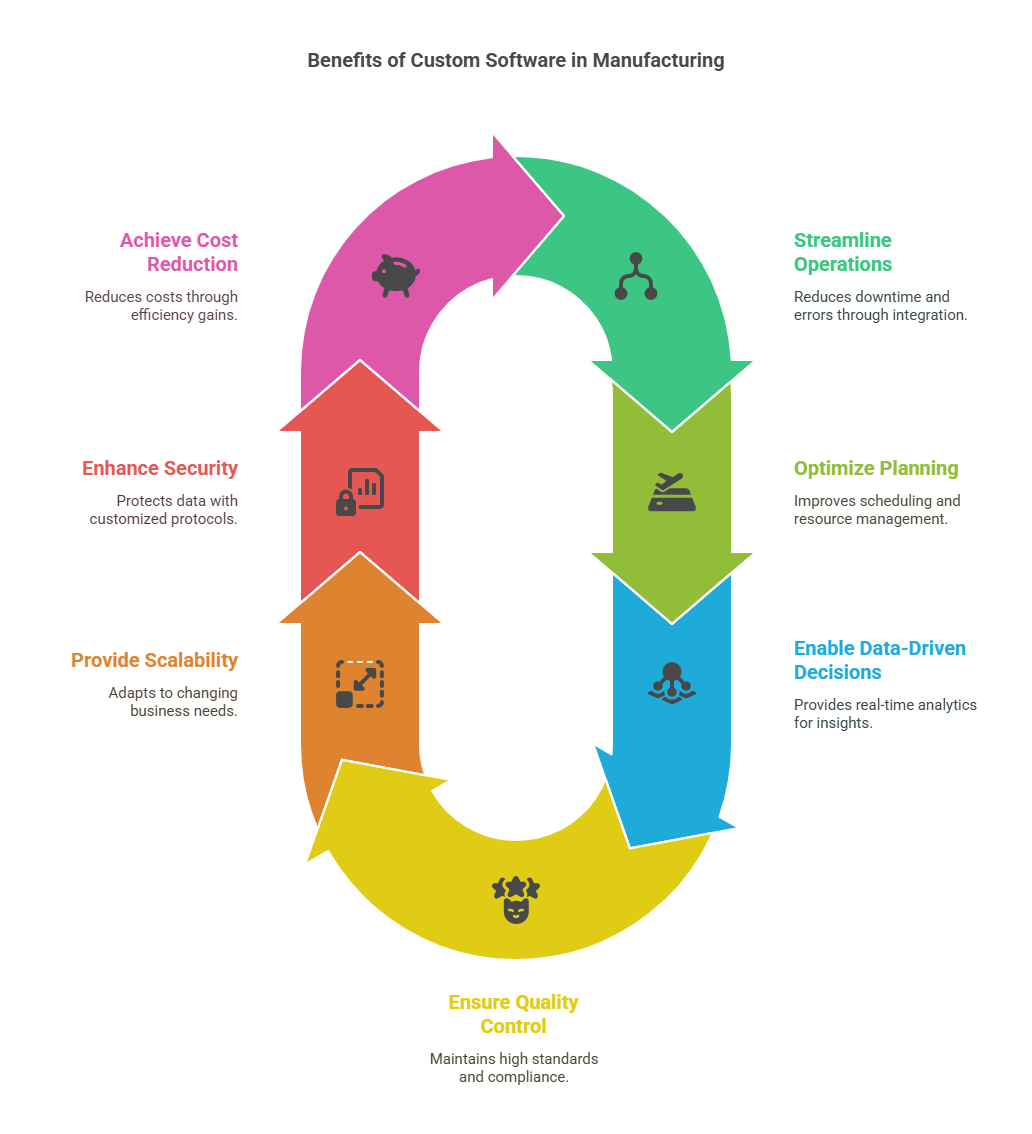Manufacturing businesses worldwide encounter perpetual production obstacles during the current era of intense industrial competition. The manufacturing industries now use customized software development as their primary response to achieve efficient processes that sustain their competitive dominance in the market. Manufacturers select customized software specifically designed to address their operational requirements thus delivering more benefits than generic software packages can provide. This article investigates the critical role of custom made software development for manufacturing and examines its impact on business transformation.
Why Customized Software Development for Manufacturing?
The requirements of manufacturing operations differ substantially from typical business needs which makes off-the-shelf software insufficient. The operations within manufacturing setups handle a multi-faceted responsibility that combines resource tracking with equipment servicing along with scheduling activities and product inspection procedures and regulatory requirements follow-through. Computing programs specially designed for these details directly address manufacturing complexities to enhance operational speed and sector adaptation capability.
Individual software development presents several benefits which enhance manufacturing activities
1. Streamlined Operations and Reduced Downtime
Manufacturing companies benefit from their own created software since it integrates all business processes within one interconnected system. Companies now require fewer alternative platforms and conventional work order execution systems. Immediate detection of possible bottlenecks takes place by implementing real-time monitoring of production systems and inventory and scheduling operations. Automation workflows minimize entry work caused by human mistakes while simultaneously shortening periods of manufacturing delay that result from human errors.
2. Better Production Planning and Scheduling
The software addresses production scheduling and planning requirements through solutions that direct focus on constraints such as machinery operating limitations and workforce availability as well as material supply needs. The optimized resource management with better deadlines leads to reduced production delays. The approach results in excellent product quality which delivers superior satisfaction to customers during extended periods.
3. Data-Driven Decision Making with Real-Time Analytics
The ability to make instant decisions stems from using custom software analytics which provides real-time operational insight to manufacturers. Managers can understand operational inefficiencies because they can forecast maintenance requirements and enhance forecasting precision through machine performance and production rate alongside quality metric and inventory level data analysis. The data enables manufacturing organizations to take proactive measures for supply chain optimization that results in increased productivity.
4. Quality Control and Compliance
Through customized software platforms manufacturers would obtain a complete overview of quality progress starting with raw materials through to finalized products. Manufacturers receive the capability to discover product issues before they reach the market so they can maintain their highest quality standards and regulatory criteria. The implementation of custom solutions enables automatic record management together with compliance reporting and reduces administrative strain and strengthens protection against noncompliance.
5. Scalability and Flexibility
Manufacturing demands regularly undergo changes because industry shifts and customer needs and expanding operations influence the process. The development of specialized software includes features that allow future business requirement changes to be incorporated easily. The custom nature of this solution provides notable value compared to standard commercial software because it can not be adequately modified while growing businesses find their original software products become unusable.
6. Enhanced Security and Data Protection
The data processing system protects sensitive information during every step of how companies handle operations in their production facilities and beyond suppliers. I believe proprietary software would enable thorough customization of security protocols based on specific business risks that would protect companies from unauthorized access attempts. Manufacturing companies obtain significant control of security protocols through the implementation of advanced security customization which leads to increased preference for their business operations.
7. A manufacturer dedicated to cost reduction during successive periods of time
Custom code does not immediately save time but it tends to deliver financial benefits for extended periods since custom applications eliminate unnecessary add-ons which allows users to avoid buying unnecessary licenses. Darwinian operational cost savings through minimized downtimes become achievable for manufacturing companies due to their enhanced productivity and reduced errors.

Essential Applications of Custom Software for Manufacturing
Various applications of custom software development exist differently for manufacturing businesses. Manufacturers currently use custom software to accomplish various business tasks that include those described below.
An advanced custom system helps organizations monitor inventory materials together with parts and finished products to manage production stock precisely and minimize product waste.
Supply Chain Management enables businesses to work directly with suppliers for placing appropriate orders and reducing delivery timelines.
The system implements production workflow automation to achieve machine status tracking and production monitoring as well as schedule production execution.
The predictive maintenance system built into software detects equipment failures beforehand to enable prompt unscheduled maintenance.
The manufacturing process requires Quality Assurance to monitor product quality from production stages until manufacturers raise notifications for quality issues while maintaining industry standards for all products.